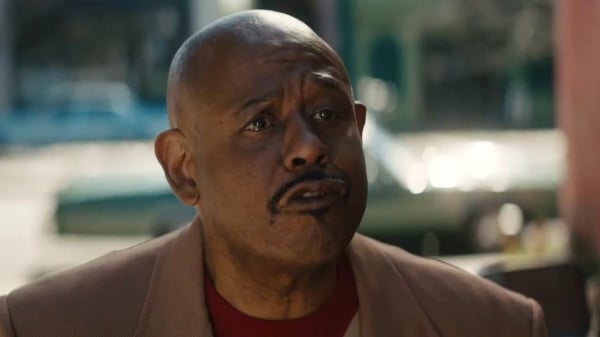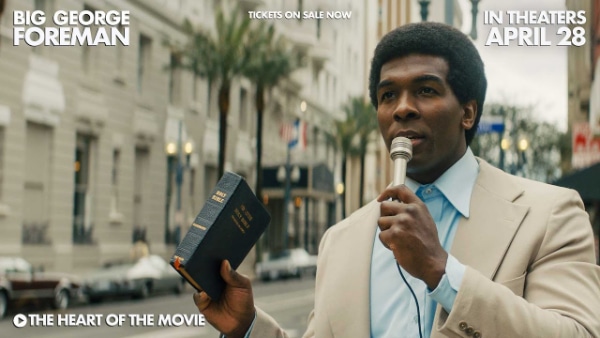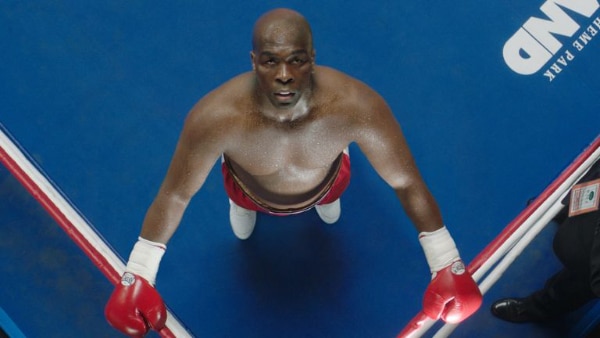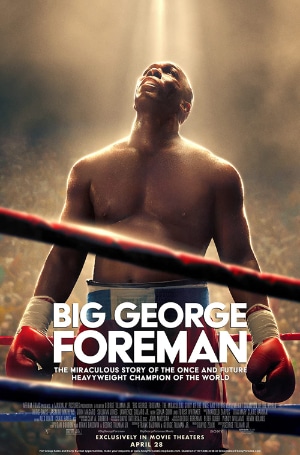The new biopic of the boxing legend, Big George Foreman: The Miraculous Story of the Once and Future Heavyweight Champion of the World, boasts a grandiosity much like it’s protagonist.
The films presents a sweeping view of the of life of the oldest boxer to win a heavyweight title. Unfortunately, it tries to do too much and ends up bouncing through Foreman’s life with too little depth.
Foreman, played by Khris Davis, certainly had his ups and downs in life. His family’s poverty meant he went to school in tattered clothes and shoes. When bullied for it, he retaliates with his fists. Yet home life was loving. There’s a moving scene where, Mom Nancy (Sonja Sohn), divvies up a takeout cheeseburger into quarters, giving one to each of the four Foreman children. Still hungry, his sister, Mary, generously breaks off a piece of her own quarter and gives it to George.
As he grows up, prospects for the hulking young man look dim. He keeps getting kicked out of school for fighting. Desperate, George signs up for Job Corps, a paramilitary group teaching various trades. There he meets Doc Broadus (Forest Whitaker), a man who changes his life.
When George pummels a recruit who steals the Converse shoes his mother sent him, it’s like he’s airing years of frustration. With the possibility of being kicked out yet again, George accepts Doc’s offer to teach him to box. “It’s a sport,” Doc explains, “with rules. Not a street fight.”

George’s success in the ring means he can give his family the comfort they never had while they were growing up. Boxing, however, begins to take its toll and, in a near-death experience, George meets Jesus and decides to throw in the boxing towel.
Taking his Bible in hand, George first takes to the streets to preach the Good News. Then he becomes pastor of a dilapidated building he buys for his little congregation. Knowing how difficult he had it as a kid, he opens a youth recreation center in Houston. It’s only when the lights go out in the center that he discovers his buddy from Job Corps, Desmond (John Magaro), has seriously mismanaged his money.

In order to re-open the youth center, Foreman seeks out his old coach, Doc, wanting to get back in the ring. The rest, as they say, is history and Foreman regains his heavyweight title at age 45.
The question I came away with as I watched this film was: what drives you? What is it that motivates you to get out of bed in the morning and live your life? It was anger that drove George’s boxing in his younger years. It was years of pent-up frustration funneled into his gloves that helped him win Olympic gold in 1968, gain his first title in 1973 against Joe Frazier (Carlos Takam), give it his all in the famous fight with Muhammad Ali (Sullivan Jones) in 1974, and endure the loss to Jimmy Young (David Jite) in 1977.

When Foreman made his comeback at age 38 after being out of boxing for ten years, he didn’t have the same anger that drove him in his younger days. What drove him? The old fire was still there but it wasn’t red hot anger. Rather, it was a desire to continue to serve God and since boxing was the only way he knew to make money, box he did.
George’s mother, Nancy, never approved of his boxing but when he was boxing in order to further the work of God, she got behind him, and a mother’s love carried him through.
Anger can be a strong motivator and we see its negative effects when we hear story after story about the violence that plagues our society. Our actions can be driven by many different emotions: anger, jealousy, and resentment OR kindness, love, compassion, and empathy. The choice is ours. George Foreman was able to grow out of the anger that drove him to live from motivations that brought good things to those he encountered. May we be able to do the same.



